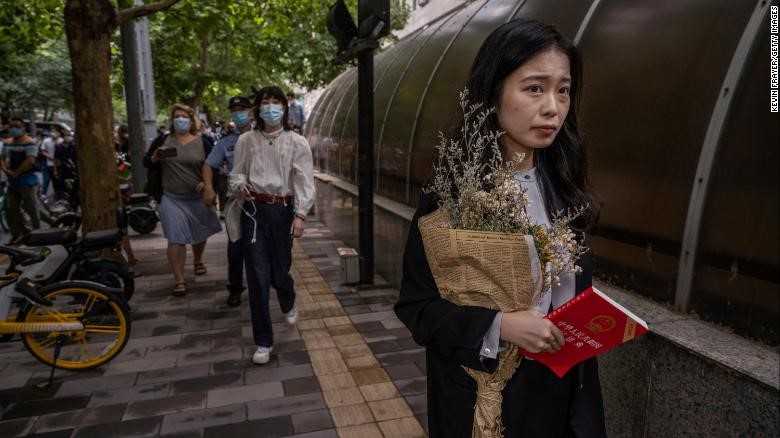 |
 |
 |
| China Film Co. | 20th Century Studios | China Film Co. |

Free Guy grossed $4.8 million during the three days of Friday, Saturday, and Sunday, bringing its China cumulative so far up to $85.1 million. Surpassing Free Guy to score first this weekend was new release Cloudy Mountain from China Film Co. The effects-heavy disaster film grossed $19.1 million over its three-day opening. Chinese citizens this week worked on Saturday in order to have Sunday, Monday, and Tuesday off this year to fete the Mid-Autumn Festival holiday, effectively shifting the start of the three-day weekend back a day.
As the days stretch on without any word of a China release for Shang-Chi, the chance of the release has grown gloomy after jingoistic netizens unearthed content featuring Shang-Chi star Simu Liu that they say “insults China.” In a 2017 interview in which Liu discusses his family’s immigrant background in a video celebrating Canada’s 150th anniversary, he said “when I was young, my parents would tell me these stories about growing up in Communist China where you had people dying of starvation. They lived in the third world. They thought of Canada as this pipe dream, as this place where they could go to be free and to create a better life for their kid.”
New titles arrived in Korean theaters in time for the Chuseok (Korean Thanksgiving) holiday period, headed by locally-made thriller On the Line, which took top place from Shang-Chi and the Legend of the Ten Rings. But the box office over the weekend preceding the big break remained subdued, totaling just $6.16 million. On the Line earned $2.16 million from 1,294 screens between Friday and Sunday and accounted for 35.1% of the nationwide box office.
The 26th Busan International Film Festival will return nearly to how it previously operated before the pandemic. The festival is set to be held from Oct. 6 to 15 in Korea’s second city, Busan. Last year, the BIFF organizer had to scale down and hold the fest without large crowd-gathering events such as the opening and closing ceremonies, outdoor greetings, and open talk sessions.
Kakao Entertainment is poised to buy leading Korean film production company Zip Cinema from its Singaporean owner Spackman Entertainment. The deal is valued at $14.8 million. Zip Cinema is the producer of Broker, the Korean-language debut of Japanese Palme d’Or winner Kore-eda Hirokazu (Shoplifters), which is now in post-production and being sold by CJ Entertainment.
The National Press and Publication Administration is re-assessing titles submitted for approval by developers from Tencent to NetEase to ensure they comply with fresh curbs on playing time and other anti-addiction safeguards unveiled in August. The watchdog turned back applications around late August and asked developers to re-submit titles with the new mandatory measures built in.
The review is stoking nerves across an industry already dealing with heightened uncertainty as Beijing pursues a campaign to rein in unruly internet spheres, curb gaming addiction, and nudge its youth towards more productive pastimes. On Aug. 30, regulators unveiled rules that went into effect this month to limit play time for minors to just three hours a week, and banned companies from providing services to users without real-name registration. Beijing is also zeroing in on “money worship” and unsavory content such as “effeminacy.”
Dozens of employees at the company’s Shanghai and Hangzhou offices had been taken off their original jobs and told to look for new assignments inside and outside NetEase. The move comes as government regulators recently decided to slow the approval process for new games in line with efforts to reduce gaming addiction among minors.
Released in China on September 9th, NetEase and Warner Bros.’ mobile game is off to a great start – not only is it the most downloaded mobile game in mainland China, it’s sitting pretty in the #1 spot in terms of top grossing games on the Chinese App Store, according to App Annie. It’s also the top grossing iOS game in Hong Kong and Macau and #2 in Taiwan. The game has gained great acclaim for its strong artistic style, even if some players have found some of its card combat elements overly grinding in terms of monetization and gameplay.

Following franchise-high reviews, Bandai Namco’s Tales of Arise has become the 26-year-old JRPG series’ fasting selling title with over 1 million (digital and physical) copies sold. These sales bring the total franchise sales to over 26 million.
China’s broadcasting regulator has vowed to strengthen the “positive orientation” of television series production and warned against rushing to adapt danmei – or “boys’ love” – novels amid the recent crackdown on the entertainment industry. Originating in Japan, danmei has become one of China’s most popular literary themes over recent years, attracting a massive reader base, especially females pursuing equal gender relationships and dissatisfied with the longstanding tradition of mansplaining in novels. In recent years, investors and production companies have flocked to adapt the novels into TV series in a bid to make profits. Currently, over 60 dramas adapted from danmei novels with high-profile actors are either in production or scheduled for release over the coming months.
Netflix continues to signal its commitment to anime with the launch of its “creators’ lounge” in Tokyo. A video tour of the space reveals an investment in spaces and tools to support high-quality anime productions in Japan for Netflix.
The product is tentatively named Feile, and internally referred to as Luna. Currently, the app is managed by the TikTok team. ByteDance hasn’t yet officially announced the launch.
ByteDance explored a potential music business in 2019 but the project failed due to a serious lack of copyright and vague product positioning. And in China, because the music copyright market has long been monopolized by Tencent, ByteDance had little advantage. The turning point came in July this year, when the State Administration for Market Regulation fined Tencent for promoting exclusive music copyright and ordered it to lift exclusive music copyright.
The Chinese version TikTok, known as Douyin, will limit users in China who are under 14 years old to 40 minutes a day. The app’s youth mode keeps it in line with the Chinese government’s new restrictions on access to video games for younger children. Teens under 14 will only be able to access Douyin between 6AM and 10PM. The rules will apply to “real-name authenticated users” under 14, and the company encouraged parents to help their children complete the real-name authentication process, or activate youth mode when prompted by the app.
The deal includes an “esports traveling” program that allows Chinese esports fans and enthusiasts to go to South Korea and experience the South Korean esports industry.
South Korea’s anti-trust regulator has fined Google $177 million for blocking customization of its Android mobile phone operating system. The fine is the ninth largest that the KFTC has ever imposed. Its ruling also specifically bans Google from compelling manufacturers to sign AFAs. The move is significant given the leading position of Korean firms Samsung Electronics and LG Electronics in the mobile handset, tablet, and wearables markets.
The ruling is a clear setback to China’s still-fledgling #MeToo movement. Local media were mute on the ruling and all social media discussions were censored and removed. In 2018, Zhou Xiaoxuan, 28, accused prominent CCTV anchor Zhu Jun of groping and kissing her against her will four years prior while she was working for him as an intern — a case that went viral after she sued him for damages. Zhu has denied the charges. Zhou has since become one of the most prominent voices pushing #MeToo awareness in China.


